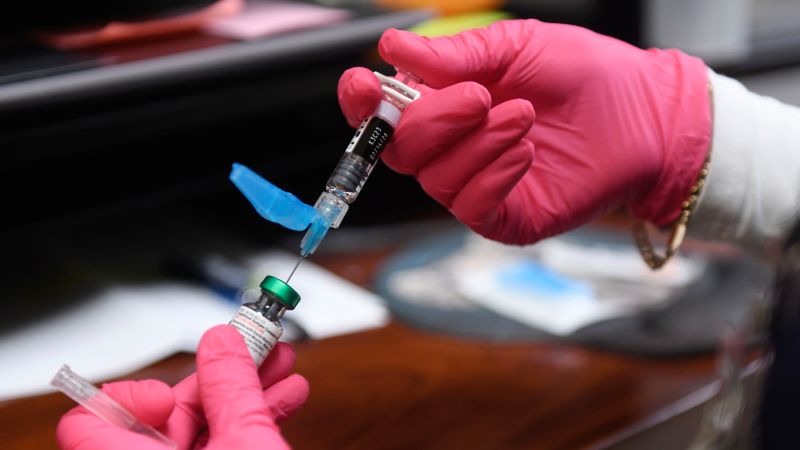
Falling childhood vaccine coverage and a significant outbreak in an undervaccinated area of West Texas have driven the United States to a troubling milestone: more measles cases have been reported this year than any other since the disease was declared eliminated a quarter-century ago.
According to data from the Johns Hopkins University Center for Outbreak Response Innovation, there have been at least 1,277 confirmed cases of measles in the US in 2025. This figure surpasses the previous record from 2019, when 1,274 cases were reported. Experts suggest that this year’s cases are likely undercounted due to underreporting. Tragically, three people have died from measles this year—two children in Texas and one adult in New Mexico—all of whom were unvaccinated.
Resurgence of a Once-Eliminated Disease
Measles was declared eliminated in the US in 2000, a significant public health achievement largely attributed to the widespread use of the measles-mumps-rubella (MMR) vaccine, which became widely available in the 1970s. Since the elimination declaration, an average of about 180 measles cases have been reported annually, according to the Centers for Disease Control and Prevention (CDC).
In 2019, outbreaks in New York, particularly within Orthodox Jewish communities targeted by anti-vaccine disinformation, threatened the elimination status. This year, the majority of cases are concentrated in Texas, with more than 750 confirmed cases linked to an outbreak that began in late January. If this outbreak continues into next year, the US could lose its elimination status.
Vaccination Challenges and Responses
Gaines County, Texas, has reported more than 400 cases since the start of the year, where vaccination rates are notably low. In the 2024-25 school year, nearly one in four kindergartners in Gaines County did not receive the required MMR vaccine, marking one of the worst rates in the state. The outbreak has also affected neighboring states, with cases reported in New Mexico, Oklahoma, and potentially linked cases in Kansas.
In response, special vaccination clinics have been established, resulting in increased vaccine coverage. Some counties have expanded vaccination guidelines, allowing infants to receive their first MMR shot as early as six months old. In New Mexico, the number of MMR vaccines administered this year has nearly doubled compared to the same period last year.
MMR vaccination rates among 6-month-olds in Texas this year are more than eight times higher than in 2019, according to Truveta, a health-care data company.
International Implications and Travel Warnings
Meanwhile, measles outbreaks have also turned deadly in Canada and Mexico. In Mexico, a large outbreak in Chihuahua has affected the local Mennonite population, while Ontario, Canada, has seen multiple cases linked to Michigan. In April, Mexico issued a travel warning for the US and Canada due to high measles rates.
The CDC has advised travelers to ensure they are vaccinated with two doses of the MMR vaccine before international travel. Most US cases this year have occurred in unvaccinated individuals, with only about 8% of cases in those who had received one or two doses of the vaccine.
Public Health and Policy Challenges
The MMR vaccine is highly effective, with one dose being 93% effective against measles and two doses 97% effective. However, measles remains one of the most transmissible diseases globally. The US Department of Health and Human Services (HHS) aims for at least 95% of kindergartners to receive two doses of the MMR vaccine, a threshold necessary to prevent outbreaks. The US has fallen short of this target for four consecutive years.
In the 2023-24 school year, a record number of US kindergartners had exemptions from required vaccinations, leaving over 125,000 new schoolchildren without coverage for at least one state-mandated vaccine, according to the CDC.
In 2019, when measles cases previously peaked, federal health officials emphasized the safety and efficacy of the MMR vaccine. However, the CDC currently lacks a director, and HHS Secretary Robert F. Kennedy Jr.’s history with vaccine skepticism has raised concerns among public health officials.
Dr. Bruce A. Scott, president of the American Medical Association, stated, “With an ongoing measles outbreak and routine child vaccination rates declining, this move will further fuel the spread of vaccine-preventable illnesses.”
Looking Forward
As the US grapples with this resurgence of measles, the focus remains on increasing vaccination rates and preventing further outbreaks. Public health officials continue to advocate for vaccination as the most effective means of controlling this highly contagious disease.
The coming months will be crucial in determining whether the US can maintain its measles elimination status or if further outbreaks will lead to a reevaluation of public health strategies and policies.






